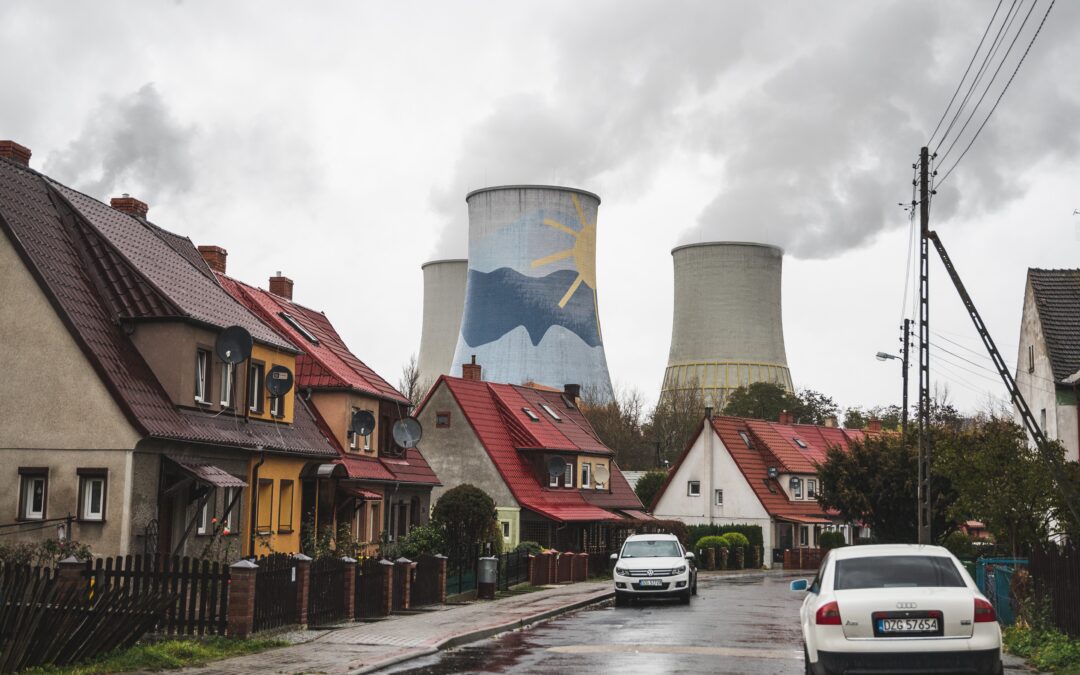
NOV 16, 2021
By André Kapsas
Turów, Poland – While the Czech and Polish governments negotiate a settlement to their dispute over the Turów mine, residents on both sides of the border remain stuck between a rock and a hard place, facing the environmental fallout of coal mining and the potentially painful social and economic impact of a green transition.
All-too-different fears around a rare Czech-Polish border dispute
After ordering a temporary halt to mining activities in May and ordering Poland to pay a half-million euro daily fine for failing to do so in September, the Court of Justice of the European Union (CJEU) last week held its opening session on the case opposing the two neighbouring countries.
According to the Czech government, Poland did not respect EU rules on environmental impact assessment before prolonging the open-pit lignite mine’s exploitation permit in 2020 despite the threat it poses to underground water supplies on the Czech side.
At the border, the international dispute has sparked tensions between inhabitants, with Poles fearing for their jobs and livelihood and Czechs worried about their water and public health. While most of the people interviewed understand the need to move away from coal, they starkly differ on the speed and scope of the transition.
“Ecology, yes. But people are more important. They need to work. If not, where will they go?” asks Danuta in the streets of Trzciniec, located in the shadow of the electric power plant’s enormous smoking chimneys. The pensioner, who worked 30 years in the power plant, struggles to envision a future for the region without the mine.
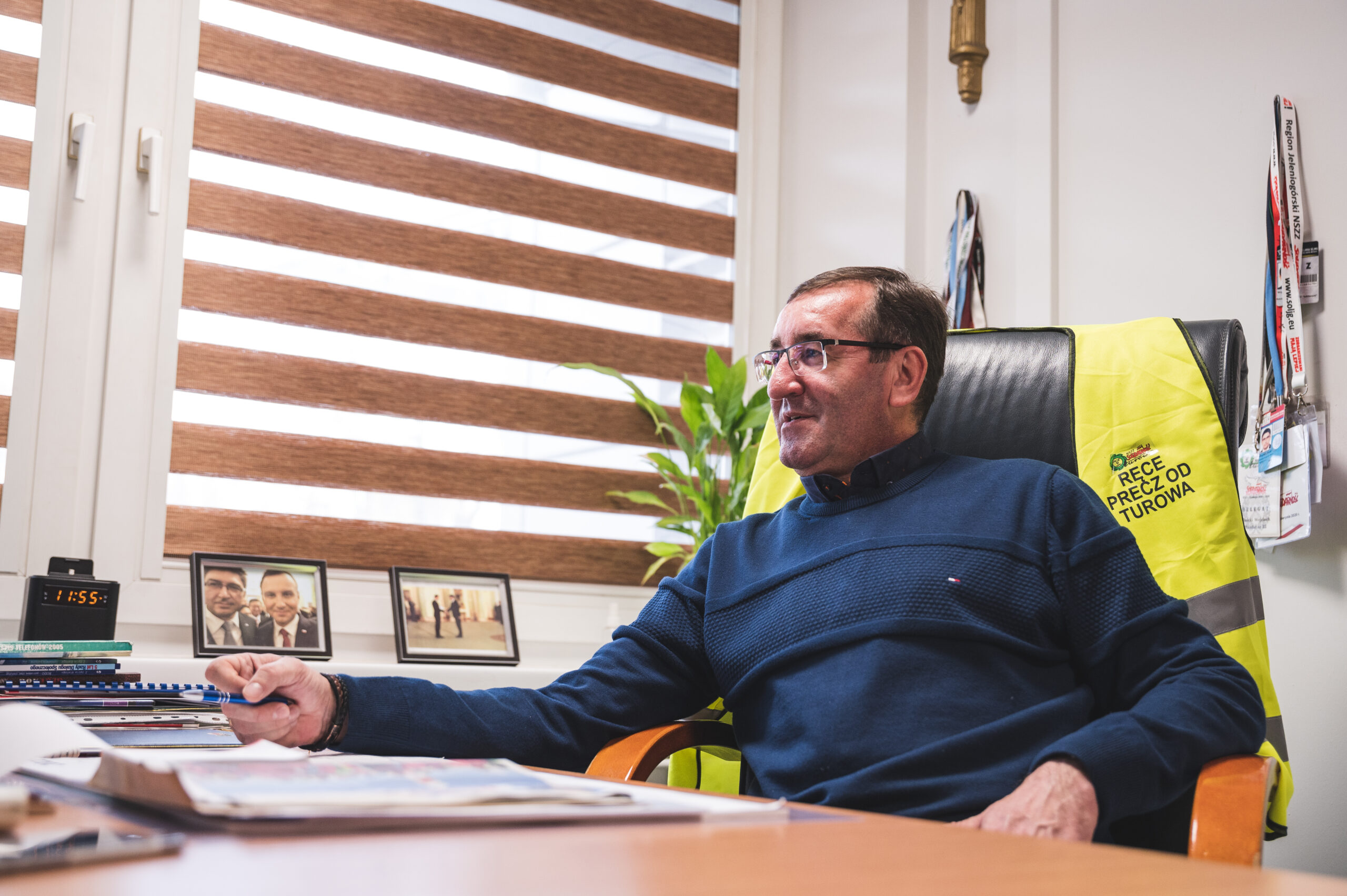
Marek Dołkowski in his office, with his yellow jacket reading “Hands off Turow”.
Photo: Roman Koziel
“In some families, the husband works at the mine and the wife at the power plant; losing their jobs would be catastrophic for them,” comments the vice-president of the Solidarity miners’ union, Marek Dołkowski. He explains that most of the factories in the region collapsed after the fall of communism, making the mine, which is run by state-owned power company PGE, one of the only remaining stable employers.
In the union’s office, Dołkowski, seated in front of a banner of Poland’s white eagle and a picture of Pope John Paul II, rails against the “madness of the EU’s Green Deal”, and questions the possibility of transforming the local economy, quoting colleagues from a nearby private mine which recently shut down.
“People were supposed to find work in solar energy infrastructure, but only several of them did. Once you install the solar panels, just a few people stay to maintain them. So long for the others!” he says.
The mayor of Bogatynia, the main town adjacent to the mine, Wojciech Dobrołowicz, does not mince his words about the European court’s decision, calling it “inhumane”, “an attack on us inhabitants, condemning us to destruction and death.” The politician, a member of the nationally ruling Law and Justice (PiS) party, claims the mine and power plant employ directly or indirectly 5,500 people (the true figure is probably slightly lower), and that each of these workers sustains four additional jobs in the region.
“We’re all for clean air”
Highlighting the town’s current dire social problems – from alcohol and drug abuse to crime and insecurity – Dobrołowicz fears a domino effect if the mine closes: “The most resourceful people will leave while the other ones will fall even lower, and the region will die out.”
“We’re all for clean air and good living conditions, but it has to take place through respect for people,” he pleads, arguing that Poland’s historical woes justify giving the country until 2049 to transition away from coal.
While he acknowledges that Bogatynia has to date done little to prepare any future after coal mining, he adds that he only took office in September 2020. He lauds his party’s achievements in the energy transition since coming to power in 2015, citing record investments in renewable energy. Lacking a clear vision for his town’s future, he nevertheless mentions plans to use municipal land to attract investors in new sectors, such as electric cars or solar panels. “We have a huge human potential in Turów’s workers, they could be re-qualified,” he argues.
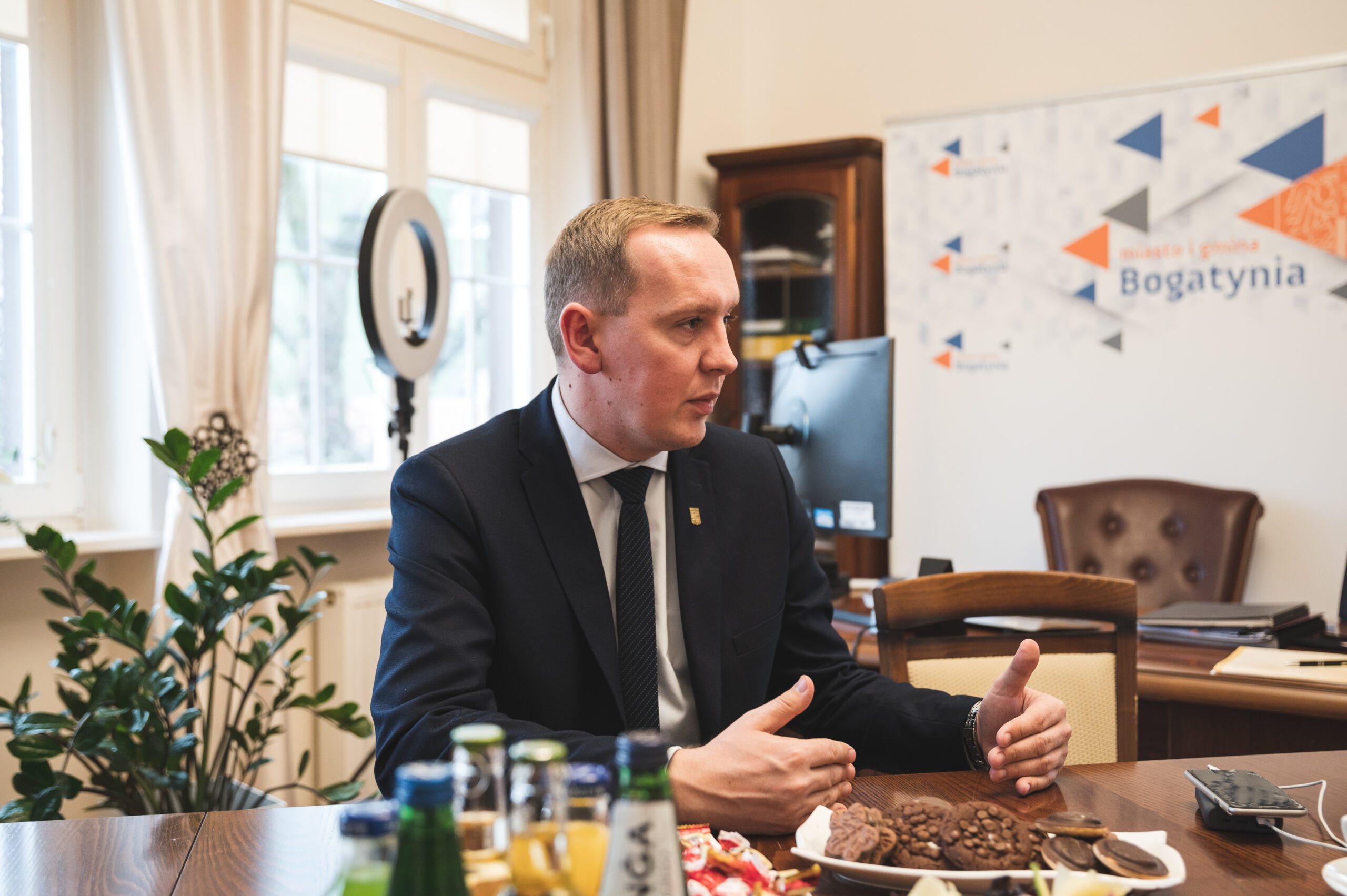
Wojciech Dobrołowicz in his office at the Bogatynia municipal hall.
“In some families, the husband works at the mine and the wife at the power plant; losing their jobs would be catastrophic for them,” comments the vice-president of the Solidarity miners’ union, Marek Dołkowski. He explains that most of the factories in the region collapsed after the fall of communism, making the mine, which is run by state-owned power company PGE, one of the only remaining stable employers.
In the union’s office, Dołkowski, seated in front of a banner of Poland’s white eagle and a picture of Pope John Paul II, rails against the “madness of the EU’s Green Deal”, and questions the possibility of transforming the local economy, quoting colleagues from a nearby private mine which recently shut down.
“People were supposed to find work in solar energy infrastructure, but only several of them did. Once you install the solar panels, just a few people stay to maintain them. So long for the others!” he says.
The mayor of Bogatynia, the main town adjacent to the mine, Wojciech Dobrołowicz, does not mince his words about the European court’s decision, calling it “inhumane”, “an attack on us inhabitants, condemning us to destruction and death.” The politician, a member of the nationally ruling Law and Justice (PiS) party, claims the mine and power plant employ directly or indirectly 5,500 people (the true figure is probably slightly lower), and that each of these workers sustains four additional jobs in the region.
“We’re all for clean air”
Highlighting the town’s current dire social problems – from alcohol and drug abuse to crime and insecurity – Dobrołowicz fears a domino effect if the mine closes: “The most resourceful people will leave while the other ones will fall even lower, and the region will die out.”
“We’re all for clean air and good living conditions, but it has to take place through respect for people,” he pleads, arguing that Poland’s historical woes justify giving the country until 2049 to transition away from coal.
While he acknowledges that Bogatynia has to date done little to prepare any future after coal mining, he adds that he only took office in September 2020. He lauds his party’s achievements in the energy transition since coming to power in 2015, citing record investments in renewable energy. Lacking a clear vision for his town’s future, he nevertheless mentions plans to use municipal land to attract investors in new sectors, such as electric cars or solar panels. “We have a huge human potential in Turów’s workers, they could be re-qualified,” he argues.

Wojciech Dobrołowicz in his office at the Bogatynia municipal hall.
Photo: Roman Koziel
Driving us to the nearby Czech border, the taxi driver evidently holds no illusion about the town’s future. “I bet the mine will close in 2030 because it makes no sense financially and technologically,” he says. Having worked 15 years there, he does not believe in a smooth transition, and nor does he see any future for the region without coal. “Young people are already leaving,” he notes.
The Czech side is only a few metres away from the road running alongside the mine, and the small village of Uhelná perched on a hill offers a direct view on the pit and power plant. From his garden, Daniel Gabryš complains that the mine is creeping towards the Czech border, bringing more noise, dust, and light pollution from night-time works.
But the worst remains the threat to water reserves. “The water is gone from all the small wells and now we all depend on one single common well for Uhelná and some neighbouring villages,” says Gabryš. He dismisses Polish arguments denying that the mine is affecting water supplies on the Czech side, citing hydrogeological measurements and common sense.
“They are taking us for idiots; they have to pump a lot of water from the mine every day and the mine is almost entirely surrounded by two neighbouring countries, so where is that water coming from?” he asks rhetorically. On the other hand, the Polish side has no problem with water, since the water pumped out of the mine is treated and distributed across its territory.
In the neighbouring village of Václavice, Michal Kopecký also blames the mine for drying up his well over the past summers. “Of course, this loss of water is caused by the mine, and not only by climate change, to which the electric power plant, by the way, is also contributing”, he says. Like other locals, he is sceptical of the underground wall being built by PGE to protect underground water, noting that its design and position seem faulty.
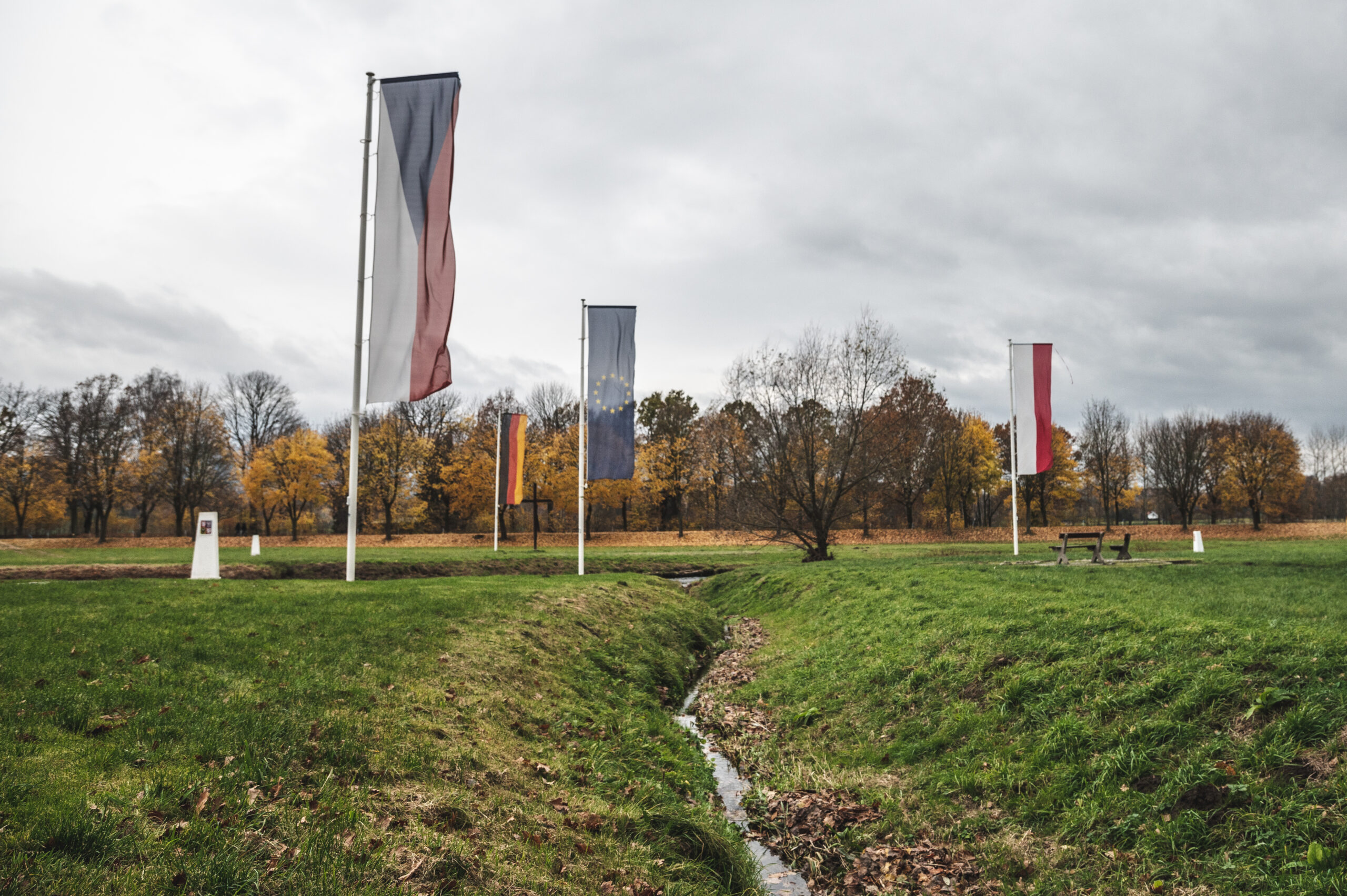
The Turow mine is located close to the Polish-German-Czech border.
Driving us to the nearby Czech border, the taxi driver evidently holds no illusion about the town’s future. “I bet the mine will close in 2030 because it makes no sense financially and technologically,” he says. Having worked 15 years there, he does not believe in a smooth transition, and nor does he see any future for the region without coal. “Young people are already leaving,” he notes.
The Czech side is only a few metres away from the road running alongside the mine, and the small village of Uhelná perched on a hill offers a direct view on the pit and power plant. From his garden, Daniel Gabryš complains that the mine is creeping towards the Czech border, bringing more noise, dust, and light pollution from night-time works.
But the worst remains the threat to water reserves. “The water is gone from all the small wells and now we all depend on one single common well for Uhelná and some neighbouring villages,” says Gabryš. He dismisses Polish arguments denying that the mine is affecting water supplies on the Czech side, citing hydrogeological measurements and common sense.
“They are taking us for idiots; they have to pump a lot of water from the mine every day and the mine is almost entirely surrounded by two neighbouring countries, so where is that water coming from?” he asks rhetorically. On the other hand, the Polish side has no problem with water, since the water pumped out of the mine is treated and distributed across its territory.
In the neighbouring village of Václavice, Michal Kopecký also blames the mine for drying up his well over the past summers. “Of course, this loss of water is caused by the mine, and not only by climate change, to which the electric power plant, by the way, is also contributing”, he says. Like other locals, he is sceptical of the underground wall being built by PGE to protect underground water, noting that its design and position seem faulty.

The Turow mine is located close to the Polish-German-Czech border.
Photo: Roman Koziel
Water and jobs: Two equally rare commodities?
Kopecký understands Poles who fear for their jobs and agrees that the transition cannot take place overnight, but he believes it is not right to accuse Czechs of wanting to get people fired or of being in it just for the money. He thinks that the transition could provide many jobs and blames the Polish government for its inaction: “It’s a cheap shot by PiS, which knows that the mine cannot last forever, but doesn’t prepare people for that, and neither does PGE”.
Along the road running through Václavice, Jan Štverák takes a break from working in his garden to comment on the situation. He is bitter about the violent reactions from the Polish side and how some Poles, last May, blocked the border crossing, while some Bogatynia businesses warned they would not serve Czech clients following the preliminary court ruling.
Štverák also shows understanding for Polish fears, but thinks that water problems should trump employment concerns. “If you lose water, you have a much more fundamental problem than if you lose your job. It’s also a problem, but it can be solved, right? You can find another job or start your own business.”
He believes Poles should look toward the future and take matters into their own hands: “Coal is not a renewable resource so it will run out anyway. Now or in fifty years, it doesn’t matter. You’ll have to settle this issue.”
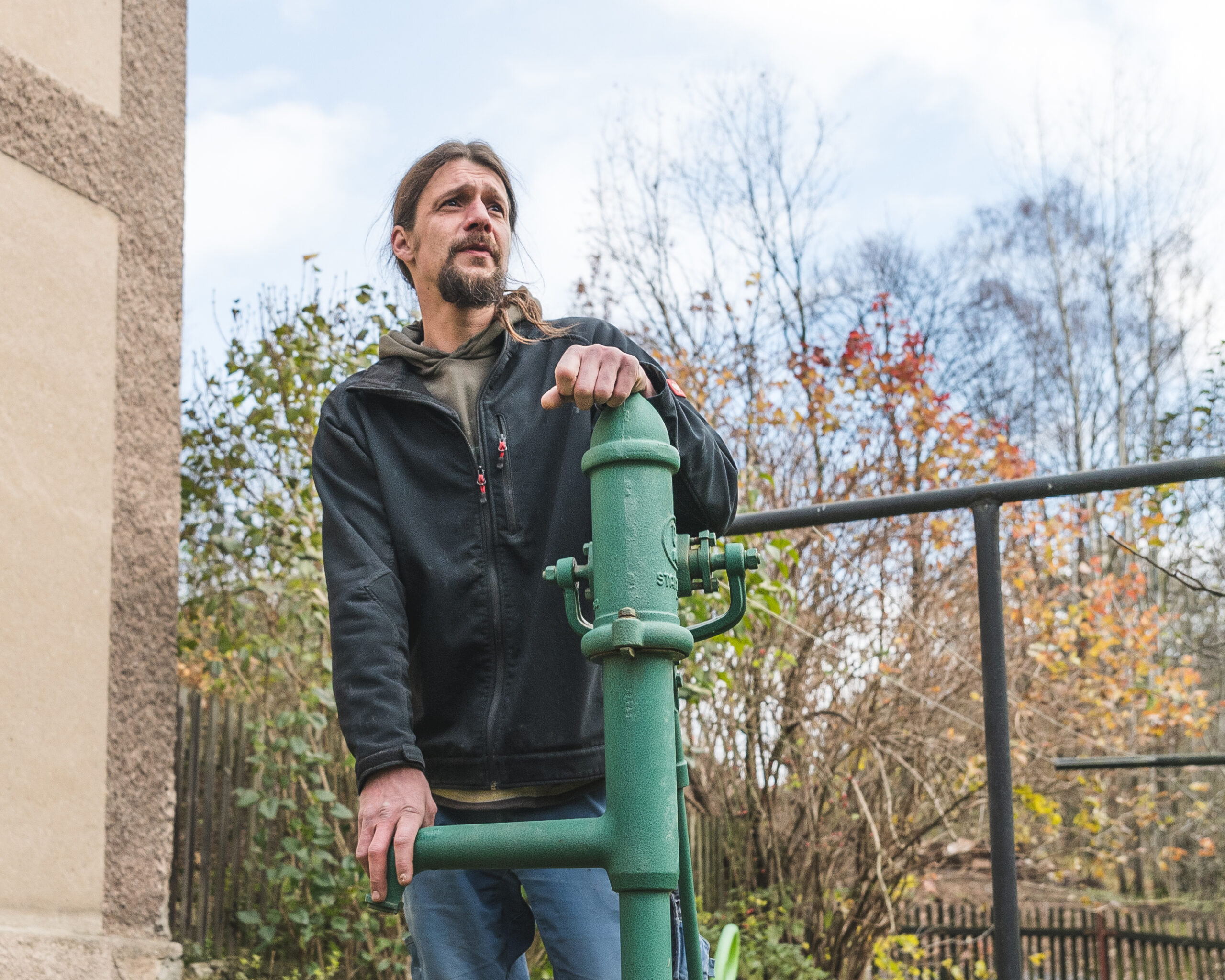
Michal Kopecký pictured next to his well’s pump.
Photo: Roman Koziel
While the two governments seem close to an agreement that will put an end to the EU court’s proceedings, it will not settle the local conundrum. Anna Kšírová, a green activist from the neighbouring city of Liberec, supports locals from the border regions, but insists the problem is wider. “It’s not just about the mine; the electric power plant has negative health impacts on the whole Liberec region,” she explains.
Citing a recent study by the Centre for Research on Energy and Clean Air (CREA), she enumerates the yearly casualties caused by the power plant: 120 premature deaths, thousands of asthma attacks, and several cases of chronic bronchitis. Most of those cases affect German and Czech citizens who live in the regions next to the power plant, meaning Turów could continue poisoning international relations for years and decades to come.
For the Polish state, a deal with Prague on Turów would probably be celebrated as a victory, but the dire perspectives for coal mining and burning remain unchanged. The Polish energy mix heavily reliant on coal (producing about 70% of electricity) cannot survive unchanged in a time of fight against climate change and rising CO2 emission permit prices.
Moreover, the transition risks are particularly painful for local communities if Warsaw continues to postpone taking tough but necessary decisions, potentially losing billions of euros earmarked in the EU’s Just Transition Fund.
Underlining that she does not wish to see the emergence of a desolated region on the Polish side of the border, Kšírová laments the illusions entertained by the government and the energy company. “People are not being told that coal burning has no future, that it is not going to be profitable. I fear the mine and power plant will crash overnight, just like in the Ostrava region [north-eastern Czech Republic], and people will be thrown under the bus.”
“The workers are the most endangered ones here. Their future is being taken away, not just because of public health risks, but because they are being lied to about the perspectives of mining until 2044”.
The article is published in cooperation with Kafkadesk.
Main image credit: Roman Koziel
André Kapsas is a Prague-based correspondent, a Central Europe and former Eastern bloc specialist, who studied political science and European affairs at the School of Slavonic and East European Studies in London, at Charles University in Prague and the College of Europe in Warsaw.
While the two governments seem close to an agreement that will put an end to the EU court’s proceedings, it will not settle the local conundrum. Anna Kšírová, a green activist from the neighbouring city of Liberec, supports locals from the border regions, but insists the problem is wider. “It’s not just about the mine; the electric power plant has negative health impacts on the whole Liberec region,” she explains.
Citing a recent study by the Centre for Research on Energy and Clean Air (CREA), she enumerates the yearly casualties caused by the power plant: 120 premature deaths, thousands of asthma attacks, and several cases of chronic bronchitis. Most of those cases affect German and Czech citizens who live in the regions next to the power plant, meaning Turów could continue poisoning international relations for years and decades to come.
For the Polish state, a deal with Prague on Turów would probably be celebrated as a victory, but the dire perspectives for coal mining and burning remain unchanged. The Polish energy mix heavily reliant on coal (producing about 70% of electricity) cannot survive unchanged in a time of fight against climate change and rising CO2 emission permit prices.
Moreover, the transition risks are particularly painful for local communities if Warsaw continues to postpone taking tough but necessary decisions, potentially losing billions of euros earmarked in the EU’s Just Transition Fund.
Underlining that she does not wish to see the emergence of a desolated region on the Polish side of the border, Kšírová laments the illusions entertained by the government and the energy company. “People are not being told that coal burning has no future, that it is not going to be profitable. I fear the mine and power plant will crash overnight, just like in the Ostrava region [north-eastern Czech Republic], and people will be thrown under the bus.”
“The workers are the most endangered ones here. Their future is being taken away, not just because of public health risks, but because they are being lied to about the perspectives of mining until 2044”.
The article is published in cooperation with Kafkadesk.
Main image credit: Roman Koziel
André Kapsas is a Prague-based correspondent, a Central Europe and former Eastern bloc specialist, who studied political science and European affairs at the School of Slavonic and East European Studies in London, at Charles University in Prague and the College of Europe in Warsaw.
No comments:
Post a Comment